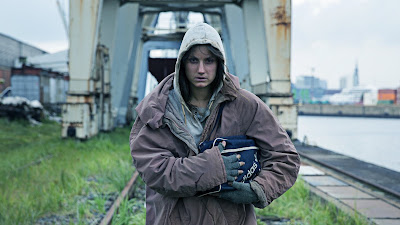Better by some distance than the much-vaunted and hugely-successful Scandinavian behemoth,
The Girl With the Dragon Tattoo series, the three full-length films that comprise the current
DEPARTMENT Q series (named for a newly organized "cold case" division of a Danish Police Department) are tighter, more focused, less florid and bizarre than that popular
Lizbeth Salander trilogy. (Of course, those very negatives are seen as attributes by those of us who love Ms Lizbeth.)
As adapted from the novels by
Jussi Adler-Olsen by
Nikolaj Arcel (shown at right, who also wrote the original
Dragon Tattoo film, as well as directing and co-writing the Oscar-nominated
A Royal Affair), the trilogy has two directors:
Mikkel Nørgaard (who helmed the first two films) and
Hans Petter Moland (the last of them). So dark and driven are all three, however, that I don't think viewers will notice much difference in style. Molan's movie takes longer to click into gear. From there onwards, it moves like a house afire.
Each tale told by each film is complete unto itself, but I would suggest beginning with the first,
THE KEEPER OF LOST CAUSES (
Kvinden i buret), as it introduces us to the characters and to this new bureau, Department Q, and to its first "case" -- looking into what was ruled a suicide but now begins to looks more like a "missing person." Here, as in each of the films, motive is as important as all else, and as we learn details of the characters of each of the antagonists, it is difficult not to feel some sympathy for them, even if we cannot excuse their actions.
In "Keeper," we also learn of the problematic victim and her history, as our two protagonists, Carl (a terrific job by
Nikolaj Lie Kaas as the troubled, driven and socially awkward detective) and his new assistant, Assad (the fine
Fares Fares, of the
Easy Money series, who can quietly handle some of the team's toughest problems). These two are not your usual police procedural protagonists. Carl is heroic, all right, but he is as apt to get beaten up and thoroughly shamed as anything else. But he endures and drives forward.
Movie two is titled
THE ABSENT ONE (
Fasandræberne), and it is the longest and, for me, the best of the three. Dealing with bullying and entitlement and how these can grow into horrific behavior if not blocked early on, the movie watches as high-school-age kids go from beating their peers to worse, until one of them can no longer handle it all. She, Kimmie, is at the heart of this tale, and
Danica Curcic (below) brings her character to splendid, dark life.
We are allowed much less empathy for the villains this time around --
Borgen's
Pilou Asbæk and
Men & Chicken's
David Dencik -- for they are upper-class nasties who seem not to have learned a thing from any of this, except to push harder, stronger and longer into death/destruction. The plotting is twisty, the investigation smart but believable, and the outcome awful, moving, and with a keen, deep sense of justice for all.
A CONSPIRACY OF FAITH (
Flaskepost fra P), the final film in the trilogy, makes a good capper, as it delves into the subject of religious faith -- the belief in which sets off the terrible tale told here, while also making it possible for this film's villain (himself an abused product of faith gone haywire) to do and even get away with his awful deeds. This theme also gives us a chance to observe Assad's Muslim heritage, as well as Carl's complete lack of religious faith. (The dark ironies ever-present in these films shine through with an icy light.)
That villain -- played with stunningly cold reserve and sharp, surprising strength by
Pål Sverre Hagen (above, right, of the
Kon-Tiki remake) -- proves a formidable character, a man apparently unfettered by most of the feelings that might trouble the rest of us.
The scene of the disappearances -- children have gone missing -- is a countryside community of some visual beauty (unusual for this series), but what we learn of those children and their religiously stifled parents is enough to put us off "god" for good. Though this final film is slow to reach blast-off, once it does, you will be as breathless, frightened and maybe a tad hopeful as you were with the preceding installments.
For folk who love police procedurals, I would consider
Department Q a "must." And if you've been somewhat disappointed with many of the other procedurals you've already seen, give Carl, Assad and these dark, Danish movies a shot. They're likely to be habit-forming.
From
Sundance Selects/IFC Films, after a very limited theatrical release, the series hits DVD (with each film on a separate disc but in a single package) this coming Tuesday, December 20, for purchase and/or (individually) for rental. The three films can also be seen currently (in high def!) via
Netflix streaming.




























































